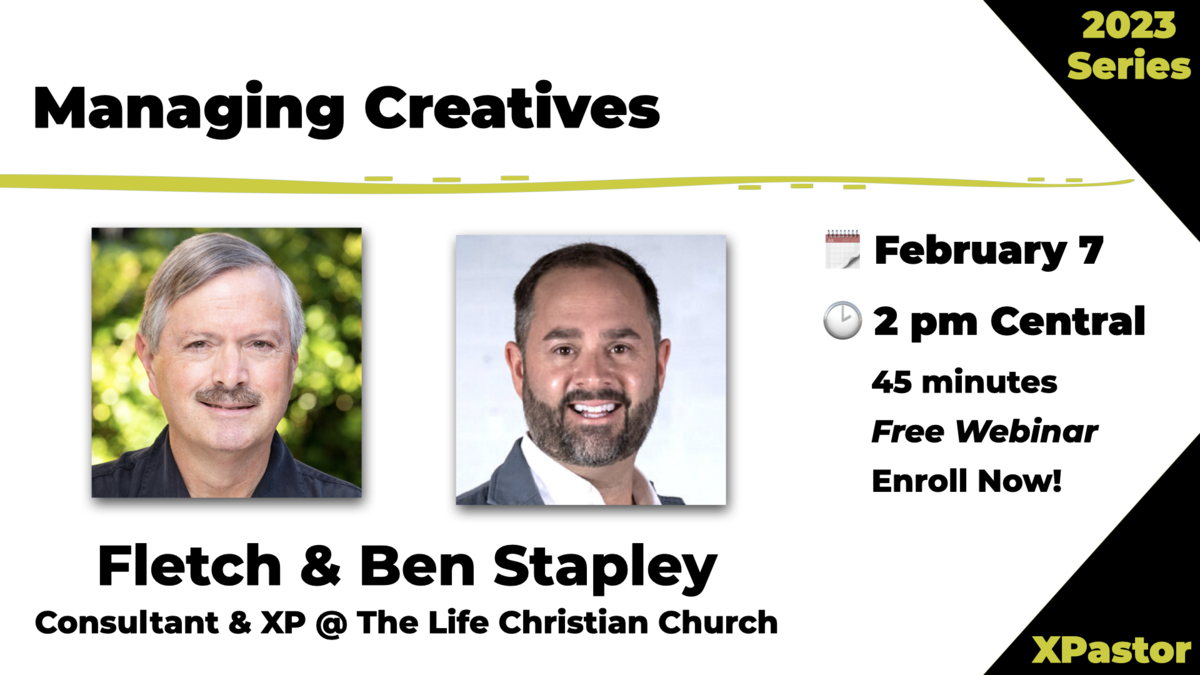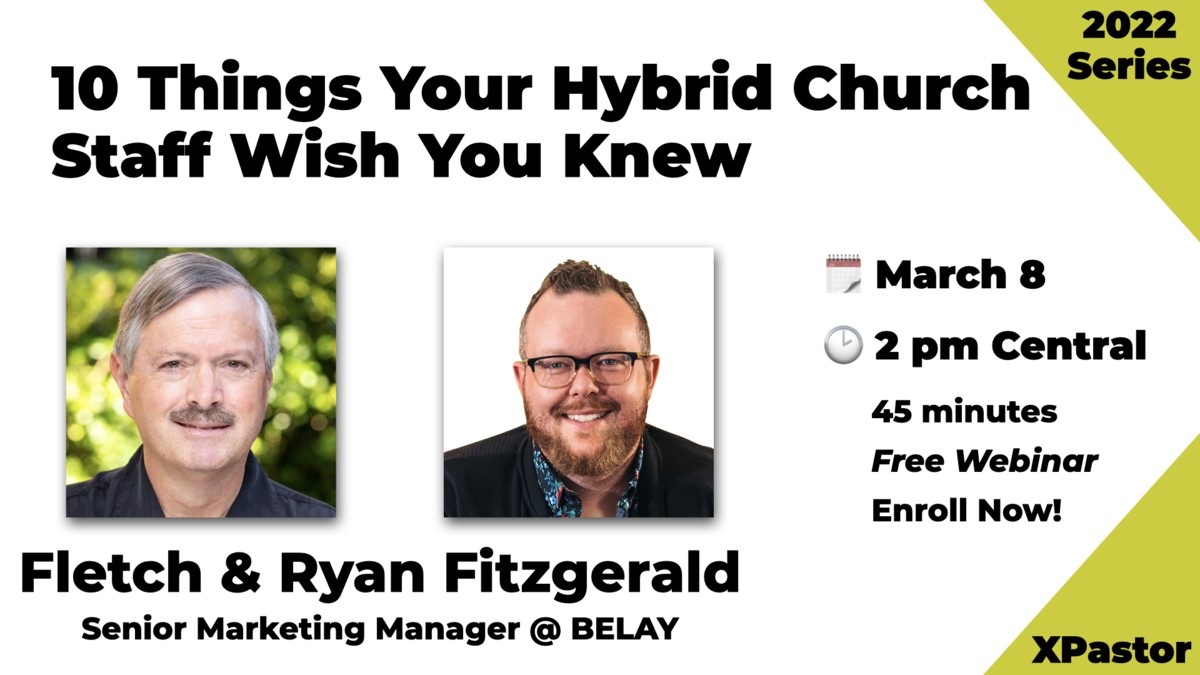XPastor tries to help churches by providing some of the essentials for running a church—items like job descriptions, employment applications, review forms and policies. Below is the Employee Handbook of Old North Church of Canfield, Ohio.
Welcome Letter from the Senior Pastor
Welcome! Welcome to the Staff Family of Old North Church. We are grateful God has sent you our way and want to express how happy we are that you’ve joined our team.
As you begin your involvement with us, I encourage you to recognize the balance we are trying to achieve—doing things in a businesslike manner (since we are an organization), while always working with spiritual and biblical principles (since we are an organism)—“the Church of Jesus Christ.”
The policies described in this handbook are designed to provide information regarding your benefits and expectations regarding your responsibilities. We want to do all that we can to make you a success; not only as a worker, but also as a person.
Whether we realize it or not, the things we value are the things that drive us. But here at the office there are two that need to stand out above the rest:
Servanthood: We are here to serve; not only because God commanded it, but also because people need it. There are thousands of people associated with Old North. They continually need to see a servant’s attitude from us. When all is said and done, that is why we are here—to serve God and His people.
Excellence: We may not always do things perfectly, but we must never do things sloppily. We want to constantly aim to do things to the very best of our ability, and then allow others to help us in going even beyond that. Mediocrity breeds mediocrity and excellence breeds excellence.
Together, we can be Servants of Excellence for Jesus Christ and for His people.
I’m glad you have joined the team!
I. Introduction
A. Our Purpose Statement: Why we exist
“To glorify God by Introducing Jesus Christ to all the people God calls us to serve so they will become His devoted followers.
B. Our Vision Statement: What we intend to do
“Reach a new generation for Jesus Christ as we live His life through our own.”
We envision God expanding His church to thousands who are genuinely worshipping Him and loving others in ways that reach a new generation.
We envision every adult member involved in a small group of people who connect with and care for each others’ spiritual and emotional health in order to be a model for those who follow.
We envision every adult member giving of their time, treasure and talent to reach a new generation—therefore involved in ministry that touches those younger than themselves through culturally appropriate ways.
We envision every adult member adopting a lifestyle of evangelism that prioritizes reaching a new generation.
We envision future facilities that will accommodate this growth and appeal to a new generation of believers.
C. Our Values Statement: What we practice—as the early church did in Acts
Love—of God and of others (Matt. 22:34-40; Rom. 12:1-2)
Instruction—from God’s Word (2 Tim. 3:16-17; 2 Peter 1:20-21)
Fellowship—connecting with and ministering to one another (Heb. 10:24-25)
Evangelism—that results in discipleship (Matt. 28:18-20)
Our Faith Statement: What we believe: (See “An Affirmation of Our Faith” cf. “Article III” in our Constitution)
D. Purpose of Staff Handbook
The contents of this handbook are presented as a matter of general policy and information only, and are not intended as a contract. Additional policy information may be provided outside of this handbook through memoranda, email, or other means of dissemination. The Old North Church reserves the right to modify or change this handbook or any of its stated policies at any time.
E. Administration of Personnel Policies
The Church Administrator is responsible for administering the policies of this handbook and recommending changes. All changes must have the approval of the Elders.
F. Objectives of Personnel Policies
The objectives of personnel policies are to:
- Seek God’s provision for the best-qualified person available to fill each position.
- Select trained leaders for the jobs that require managing people.
- Ensure that each staff member is using their gifts and abilities for what they are best suited.
- Provide the means for growth to the maximum potential for each person in exercising God-given gifts, skills, and talents.
- Provide a working environment conducive to the spiritual growth of the employee in his/her commitment to Jesus Christ.
G. Classification of Employees
- In cooperation with labor laws, ONC recognizes two types of employees: Non-exempt and Exempt (this is for overtime purposes only).
Non-exempt Staff includes:
Regular part-time (24 hours or less), or full-time hourly employees (32 hours or more)
Salaried non-pastoral staff positions below the management level
Exempt Staff includes:
Pastoral Staff
Non-Pastoral Supervisory staff
2. Interim and Temporary Employees.
Where the needs of the church require fulfillment of responsibilities on a temporary or interim basis, a position (either existing or new) may be filled by contracting with an individual for services for a limited time. In such a case, the agreement between the church and the interim or temporary employee will supersede any contrary provisions in this Handbook, particularly with respect to salary, vacation, days off, holidays, and other benefits which are specifically related to church employees whether full or part-time.
II. Conduct
A. Conduct and Attitude Toward Others
- An attitude of excellence and servanthood must be communicated to the people with whom we come in contact. To others, both inside and outside of our office, we reflect the Church of Jesus Christ.
This kind of attitude is reflected in the conduct we display towards others, such as the following:
- People are not a distraction; they are our reason for being here.
- Use people’s names when you talk to them on the phone or in person.
- Empathize with a person’s situation.
- Thank people for calling or coming in.
- Suggest alternatives when you cannot answer a question directly by referring them to someone who can.
- Treat others graciously, as God has been gracious to us. Do not respond in kind when others are not as gracious in their treatment of us.
- Never communicate information to people who are uninvolved in a particular circumstance.
- Be careful not to allow a stressful situation to adversely affect others.
- Be available to serve even when it may not be part of your job description.
- Keep a healthy balance between people and tasks.
- Everyone on staff is expected to work diligently throughout the day. Using time on the job for purposes other than that for which you were hired is robbing the church of that time, and use of church equipment for personal or non-church business is unacceptable conduct for an employee and will be treated as such. We are stewards of the resources of the church—both the salaries and the physical resources, and we need to treat them accordingly.
B. Attire
We desire to maintain a comfortable, yet professional appearance in the office. All staff should be aware of the importance of his or her appearance during working hours and how it reflects on the Church and the other staff members. Business casual attire is appropriate, although there may be times when it is desirable to dress more formally or more casually, depending on the employee’s scheduled work for the day.
On “Casual Fridays” dress jeans are acceptable, but sloppy or tattered jeans should be avoided.
C. Conduct Issues between Staff Members and Others
The Church relies on teamwork—both within the staff and between the staff and the congregation. However, we are imperfect people, and conflicts may arise. Verbal abuse, discrimination, reprisal, harassment, and mistreatment of others will not be tolerated—whether it is directed toward the staff from an outside source, or whether it occurs between staff members, at any level. If a conduct-related issue or dispute arises that cannot be resolved between the two parties, it should be taken to the following levels as appropriate for resolution:
- Immediate Supervisor
- Second Line Supervisor
- Third Line Supervisor
- Senior Pastor
- Personnel Committee
- Elders
Where an inquiry into the matter reveals unacceptable conduct on the part of one or several staff members, it shall be treated as a personnel action.
Additionally, various ministry teams must work together with respect to the use of the facility, equipment, and staff time. Conflicts may occur where two individuals or ministry teams have conflicting needs or goals with respect to the use of church equipment or staff-time. If equipment use and staff allocation cannot be coordinated below the supervisory level, the supervisors and/or the Senior Pastor may implement procedures to resolve such problems. Such procedures will be expected to be followed by all individuals, and should be communicated and enforced by the Pastor or other person responsible for the Ministry area for volunteers who are involved in equipment use.
III. Work Schedule and Leave
A. Work Schedule
- General
- Office hours are from 8:00-5:00 p.m. Monday-Thursday and 8:00-4:30 on Friday.
- It is the responsibility of each employee to maintain an acceptable attendance record and to work diligently throughout each workday. Tardiness, absenteeism (either for the entire day or for a portion of a day), failure to work diligently, or failure to follow the appropriate procedures for absences and work schedule will be treated as unacceptable conduct. Employees are responsible to report to and start work on time, and to work diligently until the end of the workday.
- Upon leaving the building for any purpose, each employee much check with his or her supervisor and indicate his or her expected time of return on the wall chart. Additionally, Pastors must verbally notify the receptionist of this absence.
- Each employee is responsible for maintaining his or her schedule and ensuring that the employee returns when indicated on the wall chart. This is imperative in order for the staff to work as a team with other staff members and the congregation, as well as demonstrating the employee’s reliability, and commitment to be accessible to the congregation.
- Non-Pastoral Staff Work Schedule
Employees are considered full time working a minimum of 32 hours per week. The typical schedule should fall between the scheduled office hours. Part-time employees should establish their schedule in conjunction with their supervisors.
- Pastoral Staff Work Schedule
- Pastoral Staff are expected to work in excess of a 40-hour week. As leaders in the church, Pastors are called to set an example for the congregation of a willing offering of their time as volunteers.
- Each Pastor will determine his working hours in conjunction with the Senior Pastor’s approval. Beginning and quitting times should be consistent throughout the workweek. Unplanned deviations from that schedule are at the discretion of the individual Pastor, but should be rare, and must be communicated with the receptionist and indicated on the in/out white board. If the deviations are frequent enough in character to suggest that the Pastor is not committed to starting work on time or being diligent about his work, the supervisor may treat this as an unacceptable conduct issue.
- In addition to Saturday, each Pastor will be given one day off per week, not including Sunday, which is a workday.
- Each Pastor will be required to periodically submit an “Old North Staff Report” to the Senior Pastor or Church Administrator. See attached form.
- Overtime and Compensatory Time
An employee may be called upon to work beyond their weekly schedule, as necessary to provide services essential for ministry that cannot be completed during his or her normal working hours. In such a case, for employees who have worked 40 hours during the week, the Supervisor may offer either compensatory time off or overtime pay for such work. Comp time and overtime must be approved in advance, and an employee who stays late to finish a project cannot expect comp time or overtime, unless it was approved in writing prior to the work. Overtime rates are based on 1 1/2 times the employee’s regular hourly rate. Approved comp time must be used within one month or it will be forfeited. Overtime is not available to an employee unless he or she has actually worked full time hours (this does not include days off) during the week. If a holiday occurs on an employee’s normal workday, it does not count against a 40-hour workweek to qualify for overtime pay.
Sick days, personal days, vacation days go against the employee’s full time hour workweek to determine overtime pay, i.e. 40 hours minus 8 hours sickday equals a 32 hour workweek and thus not eligible for overtime pay.
- Absence Policy
- Each employee must call in daily and speak personally with his supervisor if required to be absent from work or he will be late arriving due to illness or personal reasons, other than for absences pre-approved in writing. If the employee is absent on consecutive days, he or she must continue to call in for each day involved. Only where the immediate Supervisor is absent for the day may the employee speak with the secondary supervisor. Email is never an acceptable means of reporting, and voice mail messages are not acceptable except in an emergency where a number has been left where the pastor or family member can be reached.
- Vacation time, comp time, days off, and workdays out of the office must be coordinated with the Supervisor, and for Pastors, with the Senior Pastor in advance. In general, vacation requests must be submitted no later than two weeks prior to the month in which such time off is being requested, and other requests should be submitted as soon as possible. See Vacation/Personal Day request form.
- Personal Days Off:
- Each full-time Pastor will be allowed four personal days off each year.
- Each full-time Non-Pastoral staff will be allowed three (3) eight (8) hour personal days off each year.
- Part-time employees will be given personal days on a pro-rated basis.
- The use of Personal Days cannot be carried over to the next year.
B. Holidays
1. The Church office will be closed for the following holidays.
New Year’s Day
1⁄2 day Good Friday
Memorial Day
July 4
Labor Day
Thanksgiving
Day after Thanksgiving
1⁄2 day Christmas Eve
Christmas
1⁄2 day New Year’s Eve
- In the event a holiday falls on a Saturday or Sunday, an alternate date will be designated by the Church Administrator to close the office.
- In the event a holiday falls on their scheduled day off, full time employees can request a personal day in accordance with Section 6 below. If said day is a normal workday, holiday pay will be granted.
- For Full-time Pastors who must work on a holiday which occurs on a Sunday, or other day when the office has been closed for a holiday, the pastor will be given a personal day.
- Part time employees:
- No additional time will be granted if the holiday does not fall on such employee’s regularly scheduled workday.
- No additional time will be granted if such employee’s primary duties require that he or she work on the holiday, whether such holiday falls during the week or on the weekend.
- Should a holiday fall on a regularly scheduled work day and the employee’s duties are not required, the scheduled work hours will pay out at the normal hourly rate.
- The use of any personal days granted in lieu of a holiday under this subsection is not automatic. Its use must be requested in writing and approved in the manner of all other personal days, and it cannot be carried beyond fiscal year in which it was granted unless it occurs within a month of the fiscal year end and circumstances prevent the use of such personal day during that time, and the employee has received such approval from the immediate supervisor.
C. Sick Leave and Related Absences
Sick leave is a privilege; it is not a right of employees. A request for sick leave may be denied, and a doctor’s note may be required in some instances to verify illness or health related condition. All of the requirements regarding requesting leave and notifying the supervisor apply in addition to these provisions. See Sick Leave Form.
- Sick leave for full-time employees begins to accrue when employed, and shall be allotted at the rate of one (1) day per month. These days can be accrued up to thirty (30) days. Salary continuation will apply during these 30 days of eligible sick leave.
- For Pastors: If a full-time Pastor needs additional sick leave, the Church will provide the Pastor with the amount of compensation for the months indicated in the Church’s disability insurance policy.
- Medical insurance coverage is terminated once an employee has exhausted twelve (12) weeks of unpaid leave of absence in a twelve (12) month period as specified under the Family Medical Leave Act (FMLA) and has not returned to fulltime active employment.
- An employee can extend medical insurance coverage for an additional six (6) months at his own expense after the period of sick leave provided by the church’s disability policy.
- Vacation time is not accrued for the period that an employee is on sick leave.
- In the event of termination of employment, for whatever reason, all sick leave is lost and the church will make no reimbursement.
- Arrangements for extended time off due to illness, injury, etc. must be made with the supervisor in conjunction with the Executive Pastor.
- Three (3) paid bereavement days are available following the death of spouse, children, parents, and siblings.
- An employee can receive a leave of absence, with justifiable cause, for a period of sixty (60) calendar days for personal reasons, or extended illness or injury. This leave of absence is without pay and no vacation credit will accrue during the leave. Employees desiring a leave of absence should address this request in writing to the Executive Pastor, with full explanation of the reason for requesting leave. Where such extended leave will have a detrimental effect on the mission of the ONC, such leave may be denied. This leave can be extended if the circumstances of the individual case warrant such action.
IV. Compensation and Benefits
A. Pay Period
Employees will be paid bi-weekly (26 pays per year). Paydays are on the second Monday following the end of the pay period. When this day falls on a holiday then the date of payment will be the preceding Friday. Payroll deductions are made from employee’s paychecks in conformity with the Federal Income withholding Tax Regulations and Social Security requirements, where applicable.
B. Vacation Policy
- Vacation Days:
Years of Employment with ONC: Weeks Vacation:
1 …………………………………………………………… 1
2-4 ……………………………………………………….. 2
5-14………………………………………………………. 3
15+ ………………………………………………………. 4
To encourage adequate rest and refreshment, vacations must be taken before the end of the fiscal year in which they occur: they are not cumulative.
An employee must work 6 months to be eligible for vacation and personal days. The actual number of days available will be prorated the first year.
- A week of vacation is defined as one (1) workweek or five (5) individual workdays and can be utilized as such.
- A part time employee will be granted vacation based on the number of days worked per week. For example, if an employee works 32 hours per week, a week of vacation will consist of four (4) days.
- For Pastors Only: Years of Employment include prior Full-time Pastoral Experience. A pastor will be able to take the number of Sundays off as an individual has weeks of vacation. In addition, pastors who receive 1-3 weeks of vacation will be able to take one extra Sunday off so long as it doesn’t exceed the total number of vacation days allotted per year. Pastors who receive 4 weeks of vacation will be able to take 2 extra Sundays off so long as it doesn’t exceed the total number of vacation days allotted per year.
- Employees will not be paid in lieu of vacation time not used each year.
C. Compensation
1. Non-Pastoral Employee’s compensation will be determined by the job performed: wages may be hourly or an annual salary, as approved by the Senior Pastor, Elders and Unified Board. Compensation may also include benefits indicated below.
2. Pastoral Staff Compensation will include a salary including a Base and a Housing Allowance determined by each Pastor and approved by the Church Board yearly. Compensation may also include benefits indicated below.
3. A recommendation for a salary increase may be made by the Immediate Supervisor based upon the
- Changes in Responsibility (including supervisory responsibility);
- Performance;
- Additional Education; and
- Specific Cost of Living adjustments.
Compensation increases will be determined by the Elders in conjunction with the Finance Committee.
4. Medical Benefits, including Life Insurance:
Medical benefits are given to all employees working 32 hours or more, not including temporary or interim or other contract employees. The cost to the employee for family coverage will be determined annually based on the costs to the church.
5. Retirement Benefits: Retirement benefits will be paid directly to a qualified retirement account.
6. Disability Benefits: Provided for Full-time Pastors
7. If training is available and appropriate to increase an employee’s potential in his or her job at ONC, or to make the office more productive, upon approval of the Supervisor and the Senior Pastor, course fees will be paid by ONC, and the employee will be granted approval to attend during working hours.
8. Tuition Reimbursement: Educational assistance may be provided for courses of study which are directly related to the employee’s present job or which will enhance the employee’s potential for advancement to a position within the ONC.
- The church will reimburse 50% of the total cost of tuition and books for each course where the employee achieved a grade of “B” or better.
- The employee must be currently employed at the completion date to receive reimbursement.
- Only full-time employees are eligible.
- The employee must have completed one year of full-time employment with ONC.
- The employee must not be eligible to receive financial aid from any other sourc.
- No more than two courses will be considered per grading period for reimbursement.
- Class attendance and completion of study assignments shall be accomplished outside the employee’s regular working hours.
- Reimbursement will not be made where educational courses interfere with the employee’s work or there is a negative affect on the employee’s job performance.
See Tuition Reimbursement Form.
- Conferences and Seminars
- Full-time employees may be given up to 5 working days per year to attend conferences and seminars. The church may cover the expenses of tuition, travel, lodging, and food, subject to the approval of the supervisor and as authorized in the budget.
- If a spouse attends a conference or seminar with the staff member, the church will not be responsible to cover any additional expenses related to the spouse’s attendance unless such attendance is separately approved by the Senior Pastor independent of the spouse’s relationship to the Pastor and is authorized independently in the budget.
V. Evaluation
A. Annual Evaluation
1. The Supervisor in conjunction with the Senior Pastor (and for Pastors, the Elders) will formally review each employee’s job performance in the 3rd quarter of each fiscal year. Where an employee’s job performance falls below a satisfactory level in any area of evaluation prior to that time, a performance review in the particular area will be held as soon as practicable after the supervisor notes the deficiency.
2. A copy of current evaluation forms will be given to an individual at the beginning of each annual review period. If changes are made in the evaluation form during the review period, the employee shall be given the changed form as soon as possible, and the changes shall become effective upon receipt unless otherwise indicated.
3. In the event of an unacceptable evaluation, whether such evaluation is an overall annual performance evaluation, or an interim notice of a particular deficiency, the following action plan will be implemented:
- Objectives for change shall be developed by the supervisor in conjunction with the Senior Pastor, and shall be implemented by the employee within a timeline of not more than three (3) months.
- A meeting between the employee, the immediate supervisor, and the Executive Pastor where he is not the immediate supervisor, (including for Pastors, the Elders) will ensue if objectives are not met in three months to determine whether additional time should be granted for bringing the performance level up to an acceptable standard.
- A decision concerning the employee’s continued employment by Old North Church will be made by the Senior Pastor and Elders.
B. Grievance Procedure
Employees who believe that they have been treated unfairly in the evaluation or salary increase process shall present their grievances to their Supervisor in writing within ten business days so that a satisfactory explanation may be given or corrective action taken. The Supervisor shall respond within 10 business days. If the issue is unresolved, the employee can carry the grievance to the next level under the same process as outlined relating to personnel actions. Final decisions are reached at the third level of supervision. The supervisory levels are:
- Supervisor (including second and third level supervisors)
- Senior Pastor
- Personnel Committee
- Elders
- Unified Church Board
An employee should not fear reprisal or prejudice, as both are unacceptable conduct on the part of any employee, including a supervisor.
VI. Personnel Action and Employment
A. Personnel Action
- Disciplinary Action may be taken for employee misconduct regardless of job performance. This may include (but is not limited to) the following:
- Misuse of work time or equipment
- Inappropriate dress
- Failure to cooperate with others or treat others appropriately
- Failure to follow procedures outlined in this Handbook and other Church policies
- Supervisors shall give written notice of such conduct to the employee. Such notice shall be discussed with the employee and placed in his or her personnel file. Upon the second notice, the employee and his or her supervisor shall meet with the Senior Pastor to determine if any additional personnel action will be taken, in addition to placing such notice in the employee’s personnel file. For example, where an individual is tardy or absent without leave, other appropriate action may include prorating the employee’s pay. The third infraction may result in termination of the employment with ONC.
- First Appeal of Disciplinary Action: An employee who believes that any such notice is unwarranted may appeal such action in writing within ten (10) business days to the second level supervisor who shall investigate and respond within 10 days. Where the Senior Pastor issued the notice, appeal shall be made to the Personnel Committee.
- Final Appeal of Disciplinary Action: The employee may then appeal such decision within 10 business days to the third level of supervisor, the level above the Senior Pastor being the Personnel Committee, and the level above the Personnel Committee being the Elders. This level shall investigate and respond within 30 days.
- The Senior Pastor may take issues related to their employment directly to the Unified Board which shall investigate and respond within 30 days. Their decision shall be final.
- An employee may be placed on administrative leave without pay during the pendancy of an appeal of a third notice for unacceptable conduct.
- Conduct may be so grievous that it merits dismissal, in which case the supervisor shall go directly to the Senior Pastor with such a recommendation, and the decision shall be made in the first instance in consultation with the Elders and the Unified Board.
B. Termination of Employment
1. Resignation: All employees are expected to give the church at least two weeks notice of intent to resign. Employees are expected to continue to diligently work that two-week period.
2. Every employee leaving the employment of ONC should schedule an exit interview with his or her immediate supervisor prior to the last day of employment to ensure a smooth transition.
3. Involuntary Termination: ONC retains the right to terminate an employee for any reason not prohibited by law. This includes:
- Elimination of position
- For cause considered appropriate for termination such as:
- Excessive tardiness or absence or other violations of conduct standards
- Repeated refusal to follow instructions or properly perform assigned tasks
- Theft or intentional misappropriation of ONC property
- Violations of laws concerning drugs or narcotics
- Other acts which are deemed by the Senior Pastor and Elders to make the employee unsuitable for continued ONC employment
VII. Attachments
An Affirmation of Our Faith Adopted by the Baptist General Conference in 1951
1. The Word of God
We believe that the Bible is the Word of God, fully inspired and without error in the original manuscripts, written under the inspiration of the Holy Spirit, and that it has supreme authority in all matters of faith and conduct.
2. The Trinity
We believe that there is one living and true God, eternally existing in three persons, that these are equal in every divine perfection, and that they execute distinct but harmonious offices in the work of creation, providence and redemption.
3. God the Father
We believe in God, the Father, an infinite, personal spirit, perfect in holiness, wisdom, power and love. We believe that He concerns Himself mercifully in the affairs of men, that He hears and answers prayer, and that He saves from sin and death all who come to Him through Jesus Christ.
4. Jesus Christ
We believe in Jesus Christ, God’s only begotten Son, conceived by the Holy Spirit. We believe in His virgin birth, sinless life, miracles and teachings. We believe in His substitutionary atoning death, bodily resurrection, ascension into heaven, perpetual intercession for His people, and personal visible return to earth.
5. The Holy Spirit
We believe in the Holy Spirit who came forth from the Father and Son to convict the world of sin, righteousness, and judgment, and to regenerate, sanctify, and empower all who believe in Jesus Christ. We believe that the Holy Spirit indwells every believer in Christ, and that He is an abiding helper, teacher and guide.
6. Regeneration
We believe that all men are sinners by nature and by choice and are, therefore, under condemnation. We believe that those who repent of their sins and trust in Jesus Christ as Savior are regenerated by the Holy Spirit.
7. The Church
We believe in the universal church, a living spiritual body of which Christ is the head and all regenerated persons are members. We believe in the local church, consisting of a company of believers in Jesus Christ, baptized on a credible profession of faith, and associated for worship, work and fellowship. We believe that God has laid upon the members of the local church the primary task of giving the gospel of Jesus Christ to a lost world.
8. Christian Conduct
We believe that a Christian should live for the glory of God and the well being of his fellowmen; that his conduct should be blameless before the world; that he should be a faithful steward of his possessions; and that he should seek to realize for himself and others the full stature of maturity in Christ.
9. The Ordinances
We believe that the Lord Jesus Christ has committed two ordinances to the local church: baptism and the Lord’s Supper. We believe that Christian baptism is the immersion of a believer in water into the name of the triune God. We believe that the Lord’s Supper was instituted by Christ for commemoration of His death. We believe that these two ordinances should be observed and administered until the return of the Lord Jesus Christ.
10. Religious Liberty
We believe that every human being has direct relations with God, and is responsible to God alone in all matters of faith; that each church is independent and must be free from interference by any ecclesiastical or political authority; that therefore Church and State must be kept separate as having different functions, each fulfilling its duties free from dictation or patronage of the other.
11. Church Cooperation
We believe that local churches can best promote the cause of Jesus Christ by cooperating with one another in a denominational organization. Such an organization, whether a regional or district conference, exists and functions by the will of the churches. Cooperation in a conference is voluntary and may be terminated at any time. Churches may likewise cooperate with inter-denominational fellowships on a voluntary independent basis.
12. The Last Things
We believe in the personal and visible return of the Lord Jesus Christ to earth and the establishment of His kingdom. We believe in the resurrection of the body, the final judgment, the eternal felicity of the righteous, and the endless suffering of the wicked.
Employee Understanding and Receipt
This is to acknowledge that I have received my copy of the Old North Church of Canfield’s Employee Handbook and have read it carefully. I will comply with these policies as I serve the Lord with excellence.
I am hereby advised to contact my supervisor or the Senior Pastor if there is anything that I do not understand, or to receive any additional information that may affect me.
The language of this handbook is not intended to create a contract or contractual relationship between The Old North Church and the employee, expressed or implied.
Employee Name (please print):_________________________________________
Employee Signature:_________________________________________________
Date: ______________________________________________________________
View original PDF: Old North Employee Handbook











